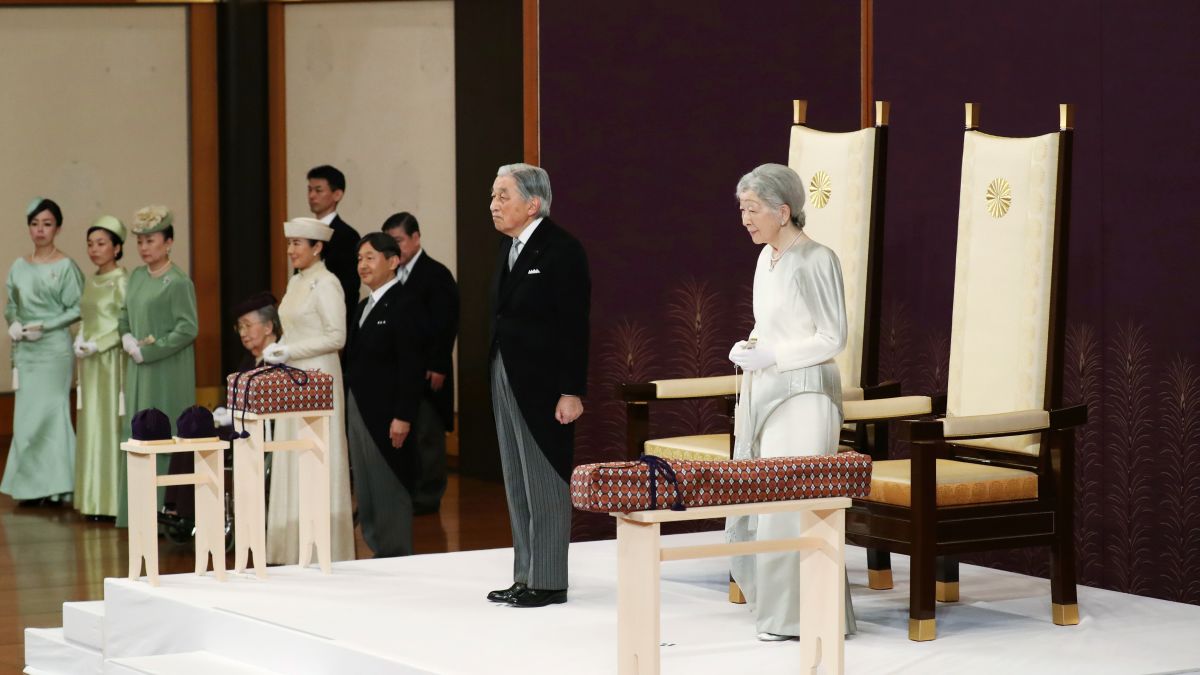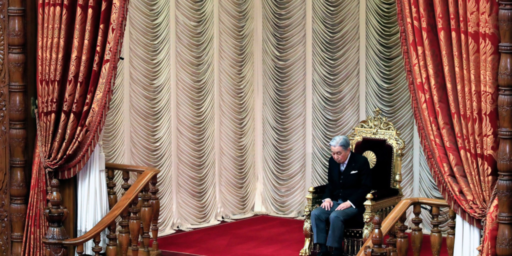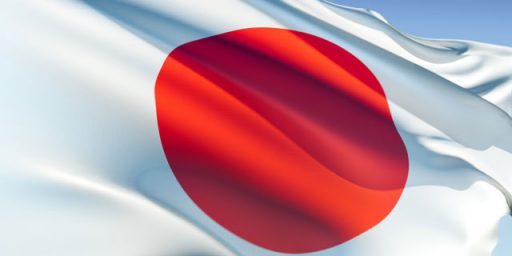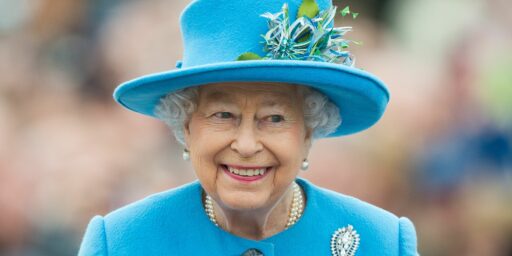Japanese Emperor Officially Yields The Chrysanthemum Throne
Emperor Akihito became the first Japanese Emperor to abdicate the throne in 200 years today.

Japanese Emperor Akihito, who has held that title since his father the later Emperor Hirohito died in 1989, has officially abdicated the throne in favor of his son, who will become Emperor Naruhito in ceremonies set to take place Wednesday morning in Tokyo:
TOKYO — Japan’s popular Emperor Akihito formally abdicated on Tuesday in a short ceremony at the Imperial Palace, giving way to his son after the weight of official duties became too much for the 85-year-old.
Dressed in a morning coat with his wife, Empress Michiko, just behind him, Akihito gave a short televised speech in the Imperial Palace’s Pine Chamber, or throne room, encapsulating the humble and peaceful values that marked his rule.
“Since ascending the throne 30 years ago, I have performed my duties as the emperor with a deep sense of trust in and respect for the people, and I consider myself fortunate to have been able to do so,” he said.
At the start of the ceremony, Akihito had walked into the room slowly with his wife, before the pair stood together in front of two thrones on a raised platform.
Their steps ringing out on the polished wooden floor, imperial chamberlains then carried in two of Japan’s three sacred treasures — a sword representing valor and a jewel representing benevolence — as well as the Privy Seal and the Great Seal of Japan, the seals of the emperor and the state, respectively.
Enclosed in cases and only ever seen by the emperor and high priests, the sacred treasures were held up to the emperor before being carefully placed on stands made of Japanese cypress. The third treasure, a mirror — representing wisdom — is kept at Ise Grand Shrine, the holiest Shinto site in Japan.
Akihito is a much-loved figure in Japan. With his wife at his side, he humanized the role of the emperor, once viewed here as a living god, by reaching out to vulnerable members of society and victims of natural disasters, and by looking ordinary people in the eye when talking to them.
But he also encouraged Japan to acknowledge its wartime past, and he never pandered to the conservative nationalists who revere the tradition embodied in his role, experts said.
Speaking on behalf of the nation, Prime Minister Shinzo Abe expressed his “deep reverence and gratitude” to the emperor and the way he had shared the “joys and sorrows” of the people.
“While keeping in our mind the way Your Majesty has lived, we the people of Japan are determined to work for the creation of a bright future for Japan as a peaceful country full of hope and pride,” he said.
Akihito is the first Japanese emperor to abdicate since the Emperor Koukaku gave way, also to his son, in 1817. His 30-year reign as ceremonial head of state ends at midnight, concluding what is known as the Heisei era.
Crown Prince Naruhito, 59, will accede to the Chrysanthemum Throne in another ceremony at the palace Wednesday morning. His reign will mark the beginning of the Reiwa era, a term taken from ancient Japanese poetry and translated as “beautiful harmony.”
“I sincerely wish together with the empress that the Reiwa era, which begins tomorrow, will be a stable and fruitful one,” Akihito said, “and I pray with all my heart for peace and happiness for all the people in Japan and around the world.”
Akihito’s father, Hirohito, now referred to as Emperor Showa, ruled Japan during a period of frenzied nationalism and militarism that ended in its defeat in World War II.
Under the U.S.-imposed constitution that followed, the emperor was confined to ceremonial duties, and was forced to renounce his divine status as a descendant of the sun goddess Amaterasu.Akihito has put those principles into practice enthusiastically. Throughout his reign he and Empress Michiko have visited elementary schools, as well as homes for the elderly and the disabled.
Takeshi Hara, who has written many books about Japan’s imperial history, said that in Emperor Showa’s era, the emphasis had been on enhancing the emperor’s authority, with the monarch addressing tens of thousands of people from elevated positions.
“Emperor Akihito changed that style radically,” he said. “He came to speak to people at the same eye level, as was seen in his visits across Japan. It’s a significantly large difference, and a style fitting to Japan’s postwar democracy.”
Akihito is fondly remembered for a moving national address he gave five days after an earthquake and tsunami hit eastern Japan in March 2011, killing nearly 20,000 people. He called on the nation to share the hardships of the suffering, and subsequently visited the region for seven consecutive weeks with Empress Michiko at the height of winter.
In the immediate aftermath of the Second World War, the status of the Emperor was the subject of some debate among American officials, many of whom believed that allowing the institution to continue even in the form of a Constitutional Monarchy would leave the nationalism and imperialism that was responsible for the war intact. It was General Douglas MacArthur and others, however, who were able to work together with Japanese officials and Hirohito himself to create the conditions that allowed the position to remain intact. In that regard, Hirohito, now known historically in Japan as Emperor Showa, adjusted to his new role well and was a key force in helping to steer his country to the representative democracy that it is today. In his wake. Akihito did much to strengthen the symbolic image of the monarchy and reign as a symbol of Japanese unity while, as noted, staving off right-wing groups that sought to make the Emperor the center of a revanchist Japan. Thanks to both of them, Japan has become a somewhat unique combination of an ancient tradition that stretches back to a time dating back to 660 B.C., making the Japanese monarchy the oldest monarchy currently still in existence.
As noted. tomorrow Naruhito, the Emperor’s eldest son will take the throne, a position he is likely to hold for many decades given the fact that he is only 59 years old, only a few years older than his father was when he succeeded Hirohito in 1989. Thanks to Japanese laws that forbid women from becoming reigning Empress, his Presumptive Heir will be his youngest brother Fumihito. This is because Naruhito’s only child is Princess Aiko. If Fumihito dies before he can ascend the throne, then the title of heir will pass to one of Akihito’s grandsons, most likely Fumihito’s son Hisahito, unless Japanese law is changed to allow Aiko, now 17 years old to succeed her father.





Given all the onerous pomp and circumstance associated with the role, I imagine that ex-emperor Akihito and ex-empress Michiko are going to bed tonight with relief. May they both have a long and happy retirement.
I hope Empress Masako will enjoy her life. I was living in Japan when she married Naruhito, and she really did not seem to be looking forward to that part of married life. I mean, here she was a modern, educated, independent woman working toward a career in the foreign service, and she gave up her own plans for a life of ceremony with this dorky prince who (the common perception was) nagged her into it.